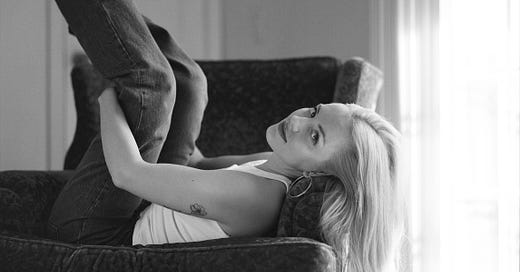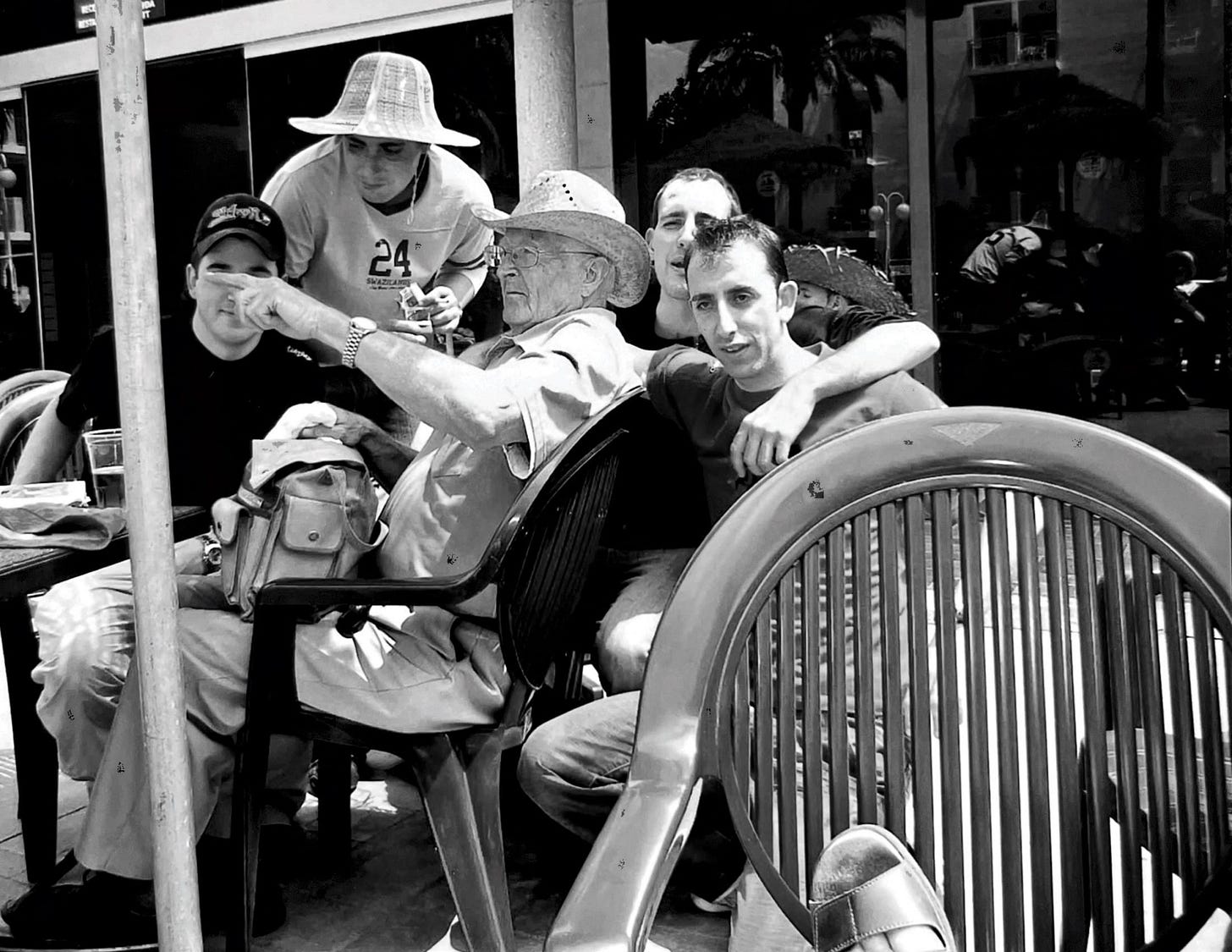On Being Seen
What I crave, cultivating the gift of sight, why I love interviewing people and how I do it.
If a person exists but no one truly sees them, do they exist at all?
I spend the vast majority of my time away from the watch of other people. I live alone, work alone, write alone. It can get a little lonely; once you narrate your every action in the third person out loud, congratulate yourself on hilarious jokes made to nobody and dance in the living room to your Close Friends on Instagram you’re probably taking isolation as a lifestyle too far. But this is what I chose and it’s also what I know. It’s comfortable, familiar, and surprisingly easy. There’s one problem with this, though: I crave the feeling of being seen in my intimate relationships. I’m not talking about that broader, cheap thing women want (a near-constant stream of attention) but to be seriously witnessed, considered and validated.
When you’re not seen for who you are as a child, you get really, really good at seeing other people. Growing up in my family, secrets and non-verbal information were all I had to interpret through the tension, so I did everything I could to draw those clues in and analyse them. I realised I could find out anything if I tried hard enough: nothing would get past me. Overhearing conversations, looking through messages on phones, following people around like a child stalker, writing about it, thinking, thinking, thinking, appraising the veracity of each matter. From the age of about eight or nine, me and my friend Sarah would lie in bed together or sit somewhere hidden beneath the trees at school and discuss the psychological makeup and motivations of the people in our lives with retrospectively quite shocking clarity. Children intuitively know a lot and the mistake most adults make is believing that they don’t. You can’t comprehend the emotional intelligence and nuance and mature reasoning behind your reality but you always understand some of what is going on.
If you don’t know exactly what secrets mean because you aren’t told, you internalise the bones of those stories and your future skeleton is made of them. This unsound structure is used to hold yourself up and move through the world. For me it’s made of: honesty is dangerous, conflict is to be avoided at all costs, problems must be disregarded, if something bad or dangerous happens never mention it again, emotional and physical needs are not met, cheating is the only way to possibly get those needs met and it’s the way to exit a relationship, dissociation is normal, being ignored is normal, the silent treatment is normal. Even people who grew up in functioning or “healthy” families will have a list of strange ideologies like these that were passed off as regular and natural.
While I was playing detective 24/7 I longed to be seen because I wanted connection and communication. The only people I felt could see me to some degree were the kind of relatives you spend time with occasionally: my grandad on my mum’s side, my grandma on my dad’s.
This is probably an exaggeration because I was so grateful for what he did but in my memories my grandad is astonished by me; I am a marvel. He spoke to me like I was a benevolent evangelist at his house to impart wisdom and beliefs from my own land. He’d have comments and questions and encouragement, noticing particular qualities that I possessed: he called me clever, funny, a weird little thing. I left him with my heart recharged, suddenly a real person with form and substance.
My grandad knew all about being seen because he was a local star. He shouted and sang as though it were a compulsion. At weddings or on holidays strangers would flock around his table, roaring with laughter. He was obsessed with Ireland: he’d play Irish folk music at home, collect Irish friends and whenever he was drunk, which was a lot, his Bristolian accent would slip into this deranged put-on half-Irish. I remember my nan going to drag him back from the pub on many occasions. When he got lung cancer I thought it just couldn’t be true. There were no clues. He smoked but rarely. How could a character so enormous he dominated every room just disappear?
After he died, I waited for his spirit to barge through the door in a mysterious form but it didn’t. At his funeral the austere Catholic pomp of it all didn’t reflect who I knew him to be. The vicar had a silver thurible and swung it around near the coffin, incense billowing out, which was disturbing and reminded me of Grandad’s cigarettes: didn’t the vicar get how fucked up that was given the guy had died of lung cancer and what if inside the coffin he couldn’t breathe? By the time we shuffled out the church like the undead, I was howling in pain. I cried at the reality of someone so vivid being erased but mostly, selfishly, because a light that shone on me, that saw whatever was inside, had gone out.
For a few more years, I still had my grandma, who was similarly unique – a tiny, kind and ruthlessly sarcastic lady who religiously wore wigs under hats and sighed and looked to heaven when anyone said anything stupid – and saw me clearly. She taught me to read, bought me books I was too young for and later, when I received condescending feedback on a piece of creative writing, she immediately ordered and then studied a handful of the lecturer’s novels and gave me an hour-long rant about why he was a crap storyteller. A couple of times she told me that she thought I’d be a journalist. I thought that was an unconvincing idea because surely I’d be something more exciting, like an actor or screenwriter or real private investigator. But she saw a possible future and what I had to offer.
These people weren’t around enough to make up for some sort of deficit. It’s a basic detail I know about myself, as true as the fact that I have blue eyes or love karaoke or can’t swim: I was chronically unseen.
Who has that made me as an adult? A fairly codependent person in my personal life. I am attracted to people with big personalities whose issues of their own or self-interested leanings consume much of their possible capacity to see me or my qualities in technicolour. My tendency is to be avoidant and evasive when problems arise, which naturally makes them far worse and often unfixable. I spend so long looking at the other person that I can forget who I am and what I need.
There’s this ironic emotional and psychological bind we all find ourselves in as human beings where we understand the problems of our family dynamics, reject them, purport to be feverishly against them and yet their presence in our ongoing life is everywhere and we are the one to blame. We’re confused messengers of our own childhoods. It probably takes a lifetime, if you’re persistent and vigilant, to wholly stop doing what you’ve been taught.
But being unseen gave me positive skills too. I’m a one-on-one person who can lock onto another easily. I manage to find people who are looking for deep conversation. When friends or partners are stuck or lost and open to advice, I can give a thoughtful route out of confusion and sadness. My macro view of how systems work and how everything should be to succeed is frequently helpful. I quickly recognise people’s innate skills and attributes and match people with the right friends, opportunities or jobs. My favourite thing about being an editor for a culture magazine was knowing which artists matter, what they mean to culture, pairing the most compelling writer or photographer to a feature and watching them draw out something totally unique from the subject. I’d have the satisfaction of seeing them thrive on this creative assignment and know my vision was right again.
A few weeks into starting in journalism I found I loved to interview people and write it up. It was a chance to sit in front of someone and interpret them and ask anything you wanted. It was a free pass to connection. I didn’t like talking about songs sonically-speaking – I was and am terrible at describing music – and mostly ignored what the rock music journalism I began to read was doing: the intricate story of an album, its conception and creation, producers and collaborators they worked with to make it.
With me it was: but how do you feel about this? What happened in your childhood? Why did you just react in that way? Who hurt you? No one teaches you how to interview someone or write up a profile on them, you just decipher your own method through trial and error. If you’re any good you ask them what you genuinely want to know, rather than what you think you should ask them.
You take people as they are, in that moment. That’s all you have to work with, all you have to communicate with and write about. You feel their energy and decode what it shows you. You have an idea of what it is you’d like to discuss, obviously, but you listen and let them tell you what they want to say. In that, if you’re really looking hard, you see and hear what they think they’re saying, what they’re not saying, what they really mean, who they think they are and who they want to be.
Every profile, for me, comes down to one question: is this person seen or not seen for who they are?
This is both laughably conceited and embarrassingly self-indulgent: in my teens and twenties I used to feel as though I walked around like Sauron’s eye in female form. Observing, recognising with the curse of no one wanting to look back. On some subconscious level, I suppose I must have been wondering: what is wrong with me that I am not seen? Is there even anything to see here? Of course that’s bullshit. A couple of people in my life had a similar childhood to me and now have this exact way of operating too and their feedback on my behaviour, thoughts and feelings is so incisive – often difficult to hear – it amazes me every time.
One of them recently asked if I thought that we should let go of this desire to be seen or minimise its importance to us. I said no, I think it’s about seeing yourself, always, and striving to put yourself in romantic, social and work settings where you absolutely are seen and recognised clearly. Demand that you be seen and leave situations where you are unseen sooner and sooner until it becomes second nature. Tell the world that there is only one way to love you and that is to look at you deeply and with care until there is no doubt in anyone’s mind that you exist.









I am writing a piece right now about leaving working in the music industry to finally explore my own creativity. I had a similar childhood that made me doubt writing because it didn’t warrant attention or praise in my house, just praise from my teachers which just didn’t feel enough. Thank you for being an inspiration 💕
I’m so pleased that you’ve started this! You are one of my favourite writers. The artist profile landscape is quite barren these days but I always breathe a sigh of relief when I see a profile of someone and it’s by you because you do such an excellent job. Excited to read more of your work here!